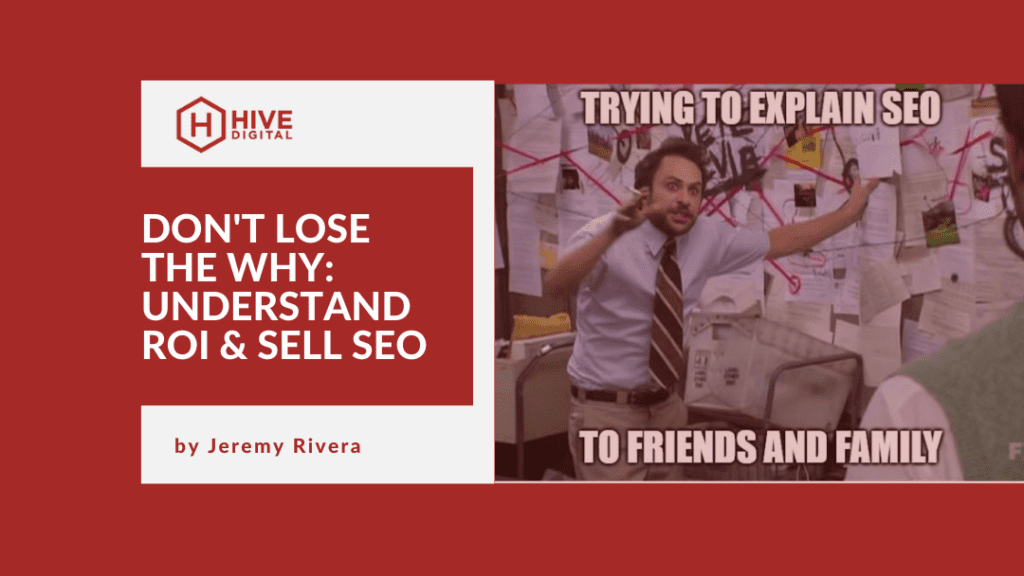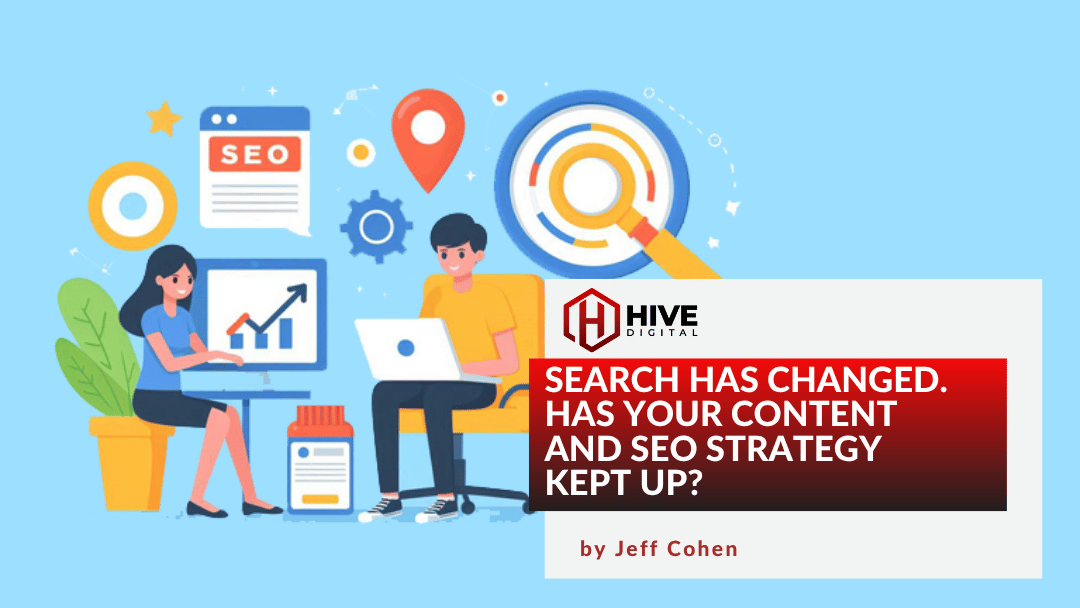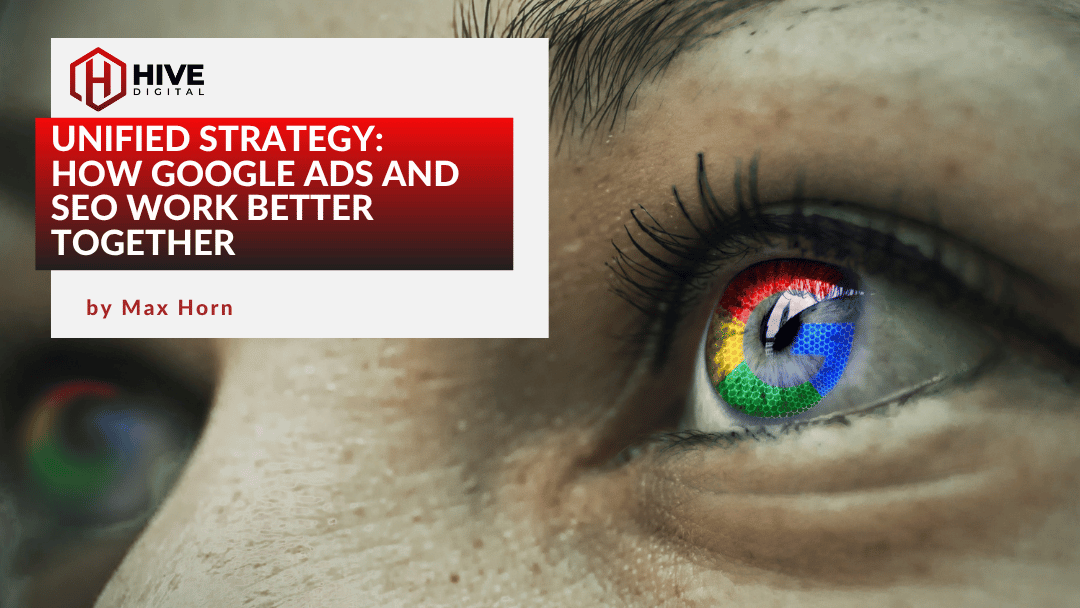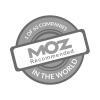People don’t buy WHAT you do, they buy WHY you do it. Simon Sinek
If you’re the salesperson at an agency, then you are in an unusual position where no one in the SEO industry is actually creating content for you, mostly because every freelancer, in-house SEO or agency is actually already doing the selling of SEO to their client (or boss).  This is a perspective for people “selling SEO” that can help you approach the value of SEO in a useful context.
This is a perspective for people “selling SEO” that can help you approach the value of SEO in a useful context.
Avoiding The Echo Chamber (Strategy Not Tactics)
Keywords, Title tags, Content Marketing, Authorship markup, Expert Roundup, Core Web Vitals, there is always an SEO trend de-jour that gets echoed around the SEO industry. From SEO Twitter, and reverberating through the various Slack channels, Facebook groups and private forums of various quality and dubiousness.
When you’re speaking to your client, are they REALLY interested in what that trend is? You may know what you do, and you might be able to talk about how you do it differently from other SEO or agencies but you always need to get down to the WHY.
Return On Investment: SEO Style
Let’s start with the basics. The basic truth. Businesses are there to make money. 
SEO is a channel to reach an audience, and experienced agencies and consultants know that instead of paying a platform like Google, Facebook or Instagram for exposure to your potential audience, you instead invest in your site for the return of organic search traffic.
Search engines can drive incredible amounts of qualified traffic and not capitalizing on that potential is a missed opportunity. If you aren’t making use of it, it’s quite likely that your competitors will be.
Doing good SEO also aligns quite well with general marketing endeavors: knowing your audience, building content for that audience, answering questions that data indicates that we certainly know that people are asking, improving discoverability by building a sound website. – Paul Shapiro, Technical SEO Team Lead at Shopify
Ideally, that traffic will go through the process of consuming your content and generating revenue either through buying a good or service, or sometimes just that visibility IS the service in the case of ad based publishers like news outlets or non-profit organizations.
Differentiation Between PPC & SEO

Pay for an ad and get a customer for that day, apply SEO and get customers everyday. Growing your customers on ads is like building a castle on sand, it has no foundation. As soon as you stop paying your castle is going to sink because you wont be getting any more customers. SEO is the foundation that can keep your business growing and customers arriving without paying for them to come.
– Ashraf Masadeh, Founder of Sqwizo
When a business opened it’s doors in 1900, you had very few ways to get the word out. You could PERHAPS get some expensive printed materials, rely on physical signage, setup an event and rely mostly on word of mouth to bring people to you for your product or service. In the digital age, there’s more and more methods and channels but they’re “pay to play”, and your immediate expense is directly linked to a specific outcome, either impressions or clicks. Once you stop your ad campaign, you don’t have traffic.
Organic search is the only marketing channel that builds value over time, returning an ROI that’s more than 5x greater than that of ads. – Jonas Sickler, SEO Manager at Tarakeet
What You Need To Build To Succeed At SEO, Goes Beyond Acquiring Traffic

Google is a search engine. It connects people who have questions to those who have answers. Being the resource that provides that answer puts you in a position to offer YOUR product/service as THE solution. It’s not about sticking “Yorba Linda Real Estate” in white text on your white background 500x on your site so you get the click from ranking number one on the Search Engine Results Page…It’s about actually BEING the MOST USEFUL result for that search.
SEO helps brands not only connect with users more effectively by meeting them throughout their customer journey with relevant and helpful content, but it also provides valuable insight into changing market and customer behavior.
This can allow brands to build more lasting relationships with customers, improve their lead generation, and grow their business.
– Jonas Sickler, SEO Manager at Terakeet

I think the Why of SEO comes from an appropriate understanding of what SEO actually is. SEO isn’t smoke, mirrors or the magical dark arts to fool Google. As the acronym expresses its about optimization. An organization that is successful continues to optimize operations and is responsive to changes.
This applies to internal processes as well as digital. SEO is just an extension of that. You are providing the most up-to-date process to allow the right audiences find the most relevant information you have as quickly as possible. By being aware of changes in how people find and consume information, your SEO strategy allows the technology that people use to find that information to clearly understand the relevance of your material.
– Bill Cutrer, Seapoint Digital
SEO Is At Work 24/7, & On Holidays
With dozens of social media posts going up about businesses that “can’t find workers”, and the largest number of workers deciding to quit and move on to greener pastures, the pressure to have employees that are reliably working for businesses is increasing. That’s why a longterm approach to your digital strategy to optimize for organic search is a great investment.

The true value of SEO is that you’re building evergreen assets for your business that work 24 hours per day to deliver higher quality leads, customers, and sales. When you optimize your content for SEO, you’re capturing targeted traffic that’s actively seeking out your products and services, which improves your conversion rates. I’ve seen a single web page that’s been well-optimized for SEO generate up to 40% of the monthly revenue for an online business through free organic search traffic.” – Stephen Hockman, SEO Chatter
Setting Proper Expectations: Avoid being a “Silver Bullet”
Of course, with everything positive that comes out of a great SEO campaign, it can become a double edged sword, as prospective clients for agencies will have heard of the amazing, through the roof success stories and likely has received deceptive cold-call pitches of miracles from SEO.

For me, no matter how hard you try, setting 100% accurate expectations is always an uphill battle. As the vendor/provider, you have no idea how many issues and potential fires you’re actually dealing with until you actually get under the hood. So when SEO agencies/consultants pigeonhole themselves into using certain measurable, like top rankings for a handful of keywords, or more phone calls, it’s as empty of a promise as you can give.You should focus on improving overall visibility, naturally, over time. “We’ll clean up your GMB structured data”, audit and review citation data to naturally improve local exposure and, AS A RESULT, better local rankings over time.”“We’ll clean up your on-page meta data, implement advanced J-Son/schema, and AS A RESULT, we’ll see a rise in impressions, organic search traffic, and rankings.”But to try to specify absolutely everything that you’ll be doing before working on the project, while making promises like more calls and better rankings, that puts both the provider and client in a difficult position because now expectations aren’t realistic.There has to be a level of trust, the client will trust that you will focus on factors that will yield results, and you have to trust that the client will give you enough time to provide natural results over time.
Let’s Get Back To The Why

The why behind SEO can change depending on your website’s objective. Whether you’re doing SEO for raw traffic, for reputation management, sales, or even to change the perception of political objectives online.It’s based on your client’s wants, needs, and problems. Strategies should be tweaked depending on your niche and your client in order to sell these services effectively. Ultimately, the end goal of SEO is used to drive traffic that will take action on a website that will be of benefit to your client’s bottom line (their profits).SEO is designed to create traffic streams that turn into revenue, coming from the search results your website is ranking for. From here, the client should enjoy an increase in sales and profits to their bottom line as a result.That’s why they are hiring you: to ultimately increase their profits at the end of the day.–Brian Harnish, Lead SEO at I Love SEO
There is no end of blog posts, resources, webinars, seminars, coaching sessions and trainers now offering to teach businesses SEO. So, as an SEO provider (in-house, agency or freelance) WHY are the directors of marketing, the founders of companies and owners of mom ‘n pop shops turning to us when they could just learn/do SEO for themselves?
We’re providing them freedom.
What’s YOUR own WHY?
Take a minute, and think about what it is about SEO that gets you, that really resonates with you. What do you respond to prospects when they ask you “WHY?”.










